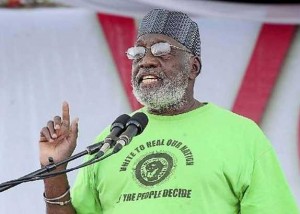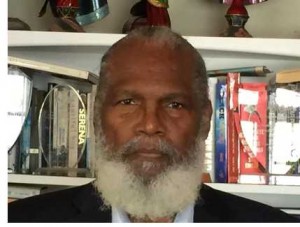By Winston H. E. Suite

Who is the man Makendal Daaga for whom there has been a call for a state funeral on his recent demise? Who is this man that has caused a sitting Prime Minister to send condolences to his family while the PM was outside of the country? Who is this man that has caused two previous Prime Ministers to send condolences to the family of the deceased? Makandal Daaga, who changed his name after the 1970 Black Power Revolution of Trinidad and Tobago in the Caribbean state of 1.4 million souls. Formally known as Geddes Granger, Daaga was in 1970 the President of the Student’s Guild at the University of the West Indies, St. Augustine Campus.
Daaga led a student protest on the St. Augustine Campus in solidarity with the West Indian students who had taken protest action at the Sir George Williams (now Concordia) University in Canada in 1969 against allegations of racism against a university professor. This solidarity protest action on the St. Augustine Campus (UWI) was followed by an incident of great significance. The students blocked the entrance to the Campus, preventing the then Governor General of Canada, Roland Michener, from entering.
The Governor General had come to Trinidad on an official visit which included a visit to the St. Augustine Campus. This event was significant in that Daaga, President of the Student’s Guild and leader of the blockade, took the protest action into the capital city Port of Spain in an attempt to gain national support for the West Indian students in Canada who at that time were facing charges before the Canadian Courts consequent to their protest action. From the action was to begin first a series of public meetings.
Daaga, together with leading members from two of the more progressive and militant trade unions in the country, the Oilfield Workers Trade Union (OWTU) and the Transport and Industrial Workers Union (TIWU) together with representatives from a number of social activist groups were to immediately form the National Joint Action Committee (NJAC) to continue public sensitisation on the plight of students. It is this organization, NJAC, of which Daaga was the leader that was to galvanize a series of public meetings and demonstrations in the two-island state (Trinidad and Tobago).
Soon the NJAC that was spawned primarily to galvanize support for the West Indian students, came face to face with the regime in office at the time and swiftly NJAC expanded its focus to include the question of racism in the country i.e. racial inequality and the social, economic and cultural schism that existed between the white or citizens mainly of European descent, on the one hand, and people of colour/blacks i.e. persons of African and East Indian descent on the other hand and the student issues at Sir George Williams University. The problem expanded from being focused on racism: black versus white in Canada to include racism at home in Trinidad and Tobago. This was a significant if not qualitative change in the focus of NJAC and Daaga.
This metamorphosis or expansion of political/social focus was to see the drawing together with NJAC of several other existing social/cultural organizations and activist groups that had virtually been labouring in the vineyard for decades. The struggle therefore was transformed into an opposition to the existing Government, the Peoples National Movement (PNM), which had at that time been enjoying decreasing support amidst growing frustration, particularly among the youth who felt that it (the government) was not doing enough to solve the social, economic and political problems associated with racism and black inequality in the society. Thus Makandal Daaga, leader of the (NJAC, became the de facto leader of the struggle against the Government and the virtual leader of the struggle against racism and social inequality in the society. He became the de facto champion of all the historical injustices and unresolved struggles in this society, including employment barriers due to race and colour.
The declaration of a State of Emergency on April 21,1970 was intended to put an end to the public meetings and demonstrations and the Government of the day moved on to detain more than 100 persons. Daaga, together with a further ten other persons were detained for six and a half months. Some say that this was the end of the 1970 Revolution while others considered that it was to signal the continuation.
NJAC was to continue in one form or another up to the present with Daaga as the leader and one of the principal actors in the “continuing” 1970 Revolution. In 1971, the Government was to declare another State of Emergency in the wake of an industrial dispute in the petroleum sector. This one was to last nine months and again Daaga was detained together with a number of other activists organisation leaders.
Daaga was subsequently to contest several national elections unsuccessfully but it was not until 2010 that he joined a coalition party, the People’s Partnership (PP) which became the Government. He was awarded the country’s highest national award and appointed an Ambassador Plenipotentiary for the Caribbean by the P.P. government.
He had fought racial discrimination and social and economic inequality in the country. He had championed the cause of racial unity between the descendants of Africans and Indians. He, together with others, had championed the cause of and were successful in, having the first of August declared Emancipation Day and a public holiday. Daaga died Monday August 8,.He would have been 81 on Saturday August 13, 2016. This is but a small part of the picture of the man Makandal Daaga ,formerly known as Geddes Granger.
Geddes Granger chose his new name Makandal Daaga after a famous African slave originally from Bight of Benin near the coast of Guinea and later from Sierra Leone who had been brought to Trinidad. In St. Joseph, which was the first capital city of Trinidad. Daaga led a small unsuccessful rebellion and was executed by firing squad together with two other slaves on the 1August 18, 1837 at the St. Joseph’s Barracks, defiant to the last, uttering “The Curse of Holloloo (God) on white men. Do they think that Daaga fears to fix his eye balls on death?” Thus defiant Daaga resisted slavery and died in rebellion.

( Winston H.E. Suite is a retired professor of civil engineering at the University of the West Indies, St. Augustine Campus. At the time of the declaration of the 1970 State of Emergency, he was one of the leaders of a social activist organization (UMROBI) and a secondary school teacher. He was detained with Makandal Daaga on both occasions of the States of Emergency in 1970 and 1971.)


